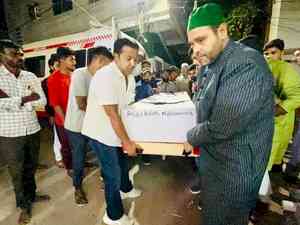WSC declared abstract submitters who are selected for the World Stroke Congress 2016 Young Investigator Award
Author(s): City Air NewsDr.Jeyaraj pandian seen along with doctors and medico's at 10th World stroke congress at HICC. photo: city air news Hyderabad, October 28, 2016: WSC declared abstract submitters who are selected for the World Stroke...

Dr.Jeyaraj pandian seen along with doctors and medico's at 10th World stroke congress at HICC.
photo: city air news
Hyderabad, October 28, 2016: WSC declared abstract submitters who are selected for the World Stroke Congress 2016 Young Investigator Award. These include Apratim Chatterjee; Sonal Chitnis; Hemanga Dhing; Nikhil Hiremath; Rupinderjeet Kaur; Niladri Konar; Pradeep Kumar; Prashant Makhija; Ajay Kumar Mishra; Shubham Misra; Samir Patel; Sudip Paul; V Prakash; and Shubhajit Roy Chowdhury, Paramdeep Singh; Ashish SusvirkarVS Vineetha; Devashish Vyas, etc. These all are from India. The others include Cyrus Escabillas, Philippines and Dilshoda Akramova, Uzbekistan.
Also, those who selected for Victor Clara Soriano Award 2016 also announced. These include Ahmad Suliman Alwahdy, and Wijoyo Halim from Indonesia; Kautubh Chaudhari, Ajay Hegde and Amitkumar Patanvadiya from India.
Many poster presentations held, where some research studies highlighted. Dr. Smriti Bose found out why stroke patients leave the hospital against medical advice. She found that 70 percent leaves because of finance and 44 per cent because of no hope. Nearly one-third of patients who get admitted for the stroke care get home against medical advice. Almost 60 % of those patients who leave hospitals against medical advice die at home. Nearly 80 percent who go home are dependent on others.
In another study done by Medico Aksheen Chahal of Christian Medical College found that out of 1071 who are treated for the stroke, nearly 332 returned to work, which is about 30.9 percent. The study was done part of the Indo-US Stroke Registry and Infrastructure Development Project, include five centers across India and one in the USA. These centers include OMC Ludhiana, PGMER Chandigarh, AIMS New Delhi and NIMS Hyderabad. Switzerland and Spain top in this list. Germany stands last regarding people turning to work after the stroke. Only 14 per cent in Germany returns to work. Finland tops the list with 54 percent returning to work, in Spain 53 per cent, Switzerland 52 per cent. In India, 33.4 per cent of stroke patients returns to work after the treatment.
In another survey Illicit Drugs Use and Stroke in India, Dr. Deepthi Arora found that North Indians use more illicit drugs than South Indians. 94 per cent of total stroke patients in North India are illegal drug users. An Opioid is a drug used by nearly 73 percent of people in North India. The other illicit drugs used are Cannabis, Cocaine, and others. Among illicit drug users in North India, Sikhs dominate with 70.59 per cent using them and. Hindus stand at 23.53 %, Muslims 2.94, Christians 2.94. Jains in North India don't use any drugs at all as per the study findings.
An exhibition was organized on the sidelines of the World Stroke Congress. Some of these exhibitors include American Heart Association, Dr. Reddy's, Cipla, Emcure, icon, Medtronic, Pfizer,
Boehringer Ingelheim, Arinna Lifesciences Ltd; Emedinexus; Emcure PharmaCeuticals, Ever Neuro Pharma; Indian Stroke Association, Stroke Association, World Federation of Neurology, Torrent Pharmaceuticals Ltd
The day two of the World Stroke Congress saw lectures of excellences and joint World Stroke Organization and Asia Pacific Stroke Organization sessions. At this meeting, an issue of Strokes in Asia was discussed.
The four-day World Stroke Congress of stroke specialists will conclude tomorrow. Nearly 2200 delegates from many countries have come to participate in the same.
The Congress is jointly organized by WSO and the Indian Stroke Association (ISA).
Some of the distinguished speakers include Dr Pooja Khatri (USA), Dr Andrew Demchuk (Canada), Prof Peter Sandercock (UK), Prof Valeria Caso (Italy), Prof Michael Brainin (Austria), Prof Hans-Christoph Diener (Germany), Prof Geoffrey Donnan (Australia), Prof Lawrence Wong (Hong Kong), Prof S Martins (Brazil).

 cityairnews
cityairnews 














